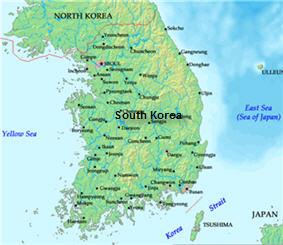 We all recall how South Korea banned the U.S. military from using VoIP, right? The South Korean government, with the backing of major South Korean ISPs pushed for the ban because of the unlimited flat-rate calling plans offered by American competitors.
We all recall how South Korea banned the U.S. military from using VoIP, right? The South Korean government, with the backing of major South Korean ISPs pushed for the ban because of the unlimited flat-rate calling plans offered by American competitors. Now, according to the Korean Times in a recent article, it states VoIP service providers were put on hold as South Korea delayed its decision on whether to allow number portability to VoIP users. Mind you, these must be South Korean VoIP service providers and not American VoIP service providers. Let me remind you that according to a Vonage Form thread I read, South Korea is blocking U.S. military personnel from making inexpensive VoIP calls back to the U.S. using American VoIP service providers such as Vonage.
The kicker is that it's the incumbent telcos and Korean-based VoIP service providers that have lobbied to block foreign-based VoIP service providers. According to the Vonage thread, "Shawn Dorcy, general manager for the Army and Air Force Exchange Service at Yongsan, said some servicemembers have had their Vonage service wrongly turned off by (ISP) LG Dacom, but the company had fixed the problem for eight servicemembers. South Korea's major Internet companies warned nearly two years ago they would block Internet calls made through providers not registered under the Korean Telecommunications Business Act. U.S. Forces Korea arranged a deal that allowed servicemembers who signed up for Vonage before July 1, 2007, to keep the service."
You got all that?
Let me summarize. American VoIP service providers are banned in South Korea, including for U.S. stationed military personnel. However, some large ISPs, such as LG Dacom will make exceptions for people who signed up for Vonage before July 1, 2007. Packet8, Teleblend, and other VoIP service providers need not apply. And apparently, only 8 servicemembers used Vonage that needed their service unblocked. I find that low number highly unlikely -- most probably decided not to fight the blocking and found another inexpensive phone calling solution to call back home to the U.S.
And now after all these shenanigans, South Korea wants to make it harder for customers to port their existing phone number to a VoIP service provider. The excuse? According to The Korean Times article, "the five executive members of the Korea Communications Commission (KCC), in a meeting chaired by chairman Choi See-joong, failed to agree on whether to allow the conversion, citing that telephone systems using the Internet are unable to provide directions on emergency calls." In other words, they're blaming 911 emergency services lack of support in the VoIP world. Actually, in Korea it's 119, or the backwards dialing of the U.S.'s 911 emergency dialing pattern and certainly their view on VoIP emergency services is half-ass backwards!
South Korea in some ways is more technologically advanced than the U.S. especially when it comes to Internet and wireless connectivity. Don't tell me South Korea doesn't have the technical know-how to integrate VoIP with emergency systems. That's bull! 9 out of 10 South Koreans own a mobile phone and if they dial 119 from their mobile, there's no guarantee emergency personnel can locate them either. Most phones still don't have GPS so would require cell tower triangulation of the cell phone signal. That takes precious time. So if South Korea was so concerned about locating its citizenry during an emergency very quickly, they would make GPS tracking on mobile phones mandatory. Of course, many emergencies occur in buildings where GPS doesn't work. There are always tradeoffs in safety vs. customer freedoms.
The answer as to why South Korea is stalling number portability for VoIP service providers can be seen in one statistic -- telecom giant KT handles around 90 percent of the country's fixed-line telephone customers. No doubt, they want to keep their customer base, and one way to do that is people's emotional attachment to their phone number (not to mention all their contacts have the number). Many people are loathe to change their phone number even if they can get a better deal elsewhere.
Heck, two years ago, the U.S. Congress, which is very partisan these days, overwhelmingly voted to take control of the E911 issue from the FCC (See: "We'll handle E-911"), and two years later & just one month ago, Congress passed a VoIP e911 bill. This bill requires the operators of 911 networks to allow VoIP providers to connect. It's the law of the land. Problem solved. Is it perfect? No, since you can take your ATA (analog telephony adaptor) to a hotel and the E911 address information stored in the database will be incorrect. Again, there are always tradeoffs, but don't blame lack of 119 support as the reason for not allowing number portability. Anyone can see right through this lame excuse!
Related:
Number Portability Problems












